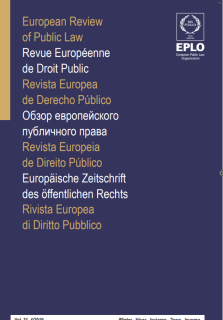
Administrative Law / Droit administratif
2018-2019
Romania / Roumanie
Associate Professor, PhD magna cum laude, Faculty of Law, University “Titu Maiorescu” Bucharest, Romania, tudor@chiuariulawyers.ro
The year 2019 brought a long-awaited codification of the administrative law. After a legislative saga comprising several previous drafts declared unconstitutional, the Administrative Code has been finally adopted, entered into force, has already passed the constitutionality test and is now under the practical test of everyday application. The first section of the chronicle refers to the Code’s main novelties and some of the provisions open to critique. In the second section of the chronicle, we discuss the relevant jurisprudence of the Constitutional Court of Romania. In the first case under scrutiny, the Court approached the divide of discretionary powers in the appointment/dismissal of chief prosecutors. In the second, it declared that the exclusion of an economic operator from a public procurement procedure based on an ongoing criminal investigation breaches the presumption of innocence, a decision which can have a continental echo, based on the fact that public procurement is regulated primarily at the European Union level, being essential to the proper functioning of the common market. The third section draws attention on the European judicial dialogue in administrative matters, involving cases before the European Court of Human Rights and the Court of Justice of the European Union on the same issue of administrative automatic confiscation of undeclared cash sums carried when entering/exiting the European Union. Both Courts found the sanction to be in breach of the proportionality principle, which can be of relevance to similar sanctions provided for in the domestic legislation of other EU Member States.
L’année 2019 a apporté une codification très attendue du droit administratif. Après une saga législative marquée par plusieurs projets antérieurs déclarés inconstitutionnels, le Code administratif a finalement été adopté, est entré en vigueur, a déjà passé le test de la constitutionnalité et est maintenant soumis à l’épreuve pratique de l’application au quotidien. La première partie de la chronique se réfère aux principales nouveautés du Code et à certaines des dispositions critiquables. La deuxième partie évoque la jurisprudence pertinente de la Cour constitutionnelle roumaine. Dans la première affaire examinée, la Cour s’est penchée sur la répartition des pouvoirs discrétionnaires en matière de nomination/révocation des procureurs en chef. Dans la seconde, elle a déclaré que l’exclusion d’un opérateur économique d’une procédure de passation de marché public fondée sur une enquête pénale en cours violait la présomption d’innocence, un arrêt qui peut avoir un écho continental si l’on part du fait que les marchés publics, essentiels au bon fonctionnement du marché commun, sont réglementés principalement au niveau de l’Union européenne. La troisième partie attire l’attention sur le dialogue judiciaire européen en matière administrative, concernant des affaires portées devant la Cour européenne des droits de l’homme et la Cour de justice de l’Union européenne sur la même question de la confiscation administrative automatique des montants en espèces non déclarés à l’entrée et à la sortie de l’Union européenne. Les deux Cours ont estimé que la sanction était contraire au principe de proportionnalité, ce qui peut être pertinent pour des sanctions similaires prévues dans la législation interne d’autres Etats membres de l’UE.





















